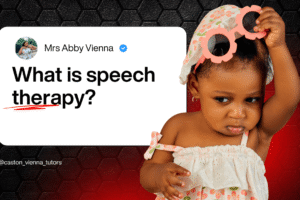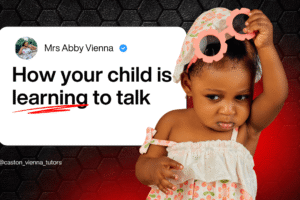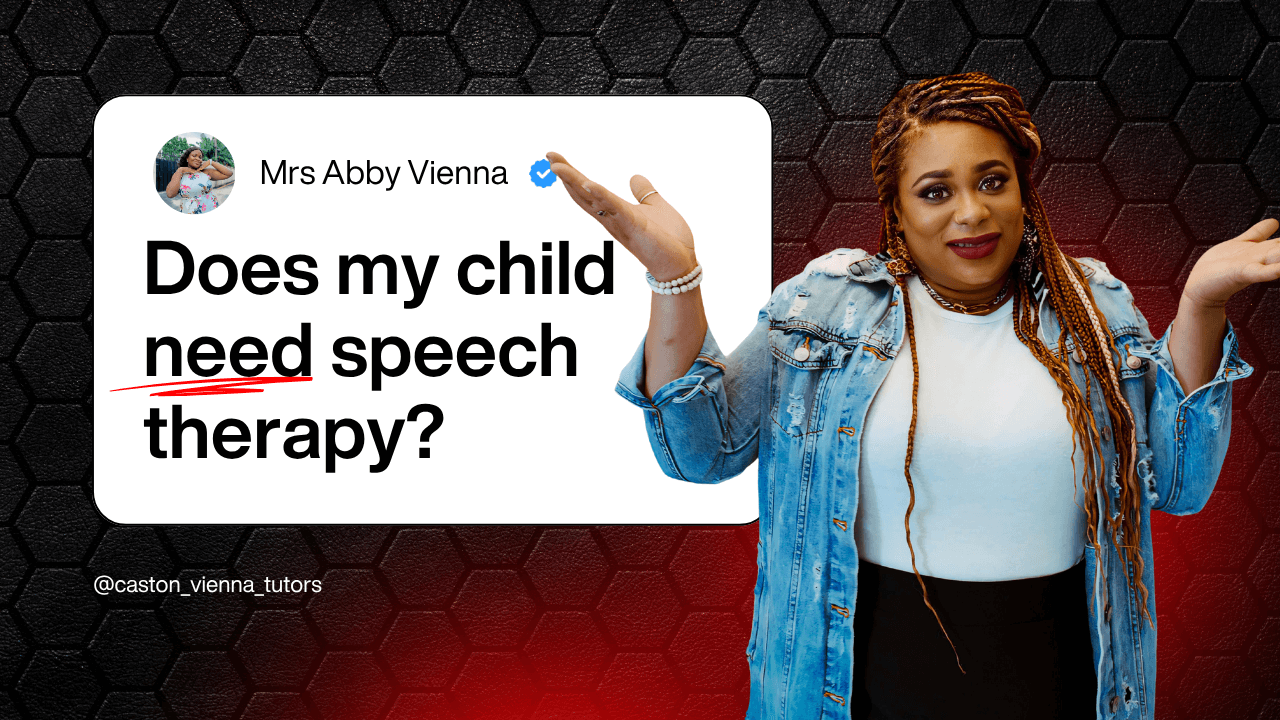
How Do I Know If My Child Needs Speech Therapy?
If you’re worried about your baby’s talking, you’re not alone. Lots of children need a little extra help learning to speak. Do not feel bad if your child needs speech therapy. But how can you tell? What if it’s just ‘part of growing up’?
Don’t you worry!
We have made this post here to show you from different angles that (1) that your child needs speech therapy is nothing to be ashamed of, (2) there are many parents who have made progress with their children’s communication, and (3) how you can also help boost your child’s communication skills, yourself or with help from a speech therapist.
Let’s start with 1. that your child needs speech therapy is nothing to be ashamed of.
Speech Therapy is Not A Bad Thing
Here, I will share a few screenshots of some moms who had speech therapy for their children.
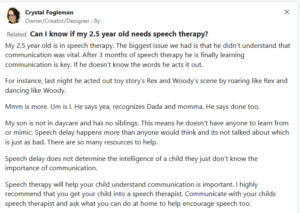
First of all, there are many factors that can cause speech delay. And the child’s brain not working is not one of them. What I mean is that you child has a healthy brain. They need help to talk. It is not a bad thing to need help. You need help to fix your car, your fridge, your leaking pipes. That does not make you weak or dumb. We all have things we need help to learn. Here is another screenshot from another mum:
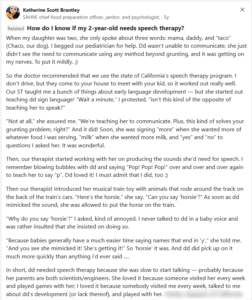
What Does Speech Therapy Do?
Speech therapy helps kids who are having trouble talking, understanding, or using language the way they should for their age. It’s not only for pronunciation, speech therapy also helps children to…
- Talk clearly
- Understand others
- Use words to express needs, feelings, and thoughts
- Use muscles in the mouth for eating, swallowing, and speaking.
First of all, let us erase the stigma from your mind.
If my child needs speech therapy, does it mean they’re dumb?
NO!!!
Let me be crystal clear, sweetie: NO. Needing speech therapy does NOT mean your child is dumb or has low intelligence.
Think of it this way:
It’s a plumbing issue, not a brain problem. Many speech issues are like a traffic jam on Aba road. You know where you are going. You know how to get there, but you are stuck and frustrated. Sometimes, it can be that your car has an issue with the tyres, or it is the other cars around you that is causing you to slow down. Either way, it is not you.
In the same way, your child’s brain knows exactly what it wants to say (that’s intelligence), but the message gets tied up between the brain and the mouth (that’s the speech mechanism). A lisp or stutter is often a control or coordination issue, not a brain issue!
So, your child is probably a genius. They only need help to learn how to navigate their words and communicate clearly. That is why the child needs speech therapy.
Separate Skills
Your child’s ability to do math, finish a puzzle or draw a picture is completely different from how well your tongue and lips coordinate to make an “R” sound. Language is about what words mean and how you put them together. Speech is about the sounds you make. Intelligence is your ability to learn and reason. They are separate. There are many incredibly bright children who have struggled with stuttering or pronouncing certain sounds.
In fact, therapy HELPS intelligence! Good speech is the foundation for reading and writing! When a child can hear and make all the sounds correctly, it makes learning to read (called literacy) much easier. By helping their speech, you are actually giving their learning a big boost!
What About Development Delay?
Here’s the thing. Speech and language issues don’t always come alone. Sometimes they’re part of a bigger picture called developmental delay. Let me break this down so it makes sense.
A developmental delay means a child is slower than other kids their age in one or more areas. This means that the child is not reaching their milestone, or they are at the milestone of a younger age. For example, a 4-year-old child using only 6 single words and only pointing when they want something may still be growing at the milestone of 18 months. This is what developmental delay looks like. A speech therapist or a neurologist may be able to give you a diagnosis after careful assessment.
How To Find Out If A Child Needs Speech Therapy?
Every child learns to talk at their own pace. It’s like how some babies walk at 9 months and others wait until they’re over a year old. But there are some signs that tell us a child might need some professional help.
What to Look For (By Age)
Babies and Toddlers (Birth to 2 Years)
By 12 Months: Are they making noises? Can they say small words like “mama,” “dada,” or other simple sounds? Do they look when you call their name?
Look out for these signs:
- Not babbling (e.g., “ba-ba” or “da-da”)
- Doesn’t respond to their name
- Doesn’t point or wave bye-bye
- Doesn’t make eye contact or try to “talk” back when you speak
If your baby isn’t doing these things, or if they’re not babbling much at all, that’s worth checking out.
12–18 months: Are they making simple requests? Are they following direction? Do they dance when you play their favourite song?
Look out for these signs:
- Not saying basic words like “mama” or “milk”
- Only grunting or pointing instead of trying words
- Doesn’t follow simple instructions like “Come here”
18–24 months: Can they say their name when asked? Do they follow two step direction? Can they call names of members the family close to them?
Your child needs speech therapy if he
- Has fewer than 20 words by 18 months
- is not combining two words by age 2 (“more juice”)
- You can’t understand anything they say
2–3 years: Can they put two words together (like “more milk” or “go out”)? Can they make a sentence? Do they follow simple instructions, like “get the ball and bring it here”?
Look out for these signs:
- People outside the family can’t understand them
- They don’t ask for things with words
- Still relying mostly on gestures and sounds
- Very limited vocabulary or repetitive speech (e.g., echoing phrases)
3–4 years: Are they using sentences with 3 or more words? Their speech should be clear most of the time. They should be able to tell simple stories and answer questions like “who,” “what,” and “where.”
When to be worried:
- Can’t form simple sentences (“I want food”)
- Leaves off a lot of sounds (“ca” for “cat”)
- Struggles with social conversation (no back-and-forth)
- Frustration tantrums when trying to speak
School Age Kids (5 and Up)
By kindergarten, children should be able to tell you a story that makes sense. They should say most sounds correctly, though some tricky ones like “r” and “th” might still be developing.
Other Warning Signs (Any Age)
- Stuttering that won’t stop – Children repeat words sometimes, but if it’s happening a lot and they seem frustrated, get it checked.
- Voice sounds funny – If their voice is always hoarse, too nasal, or sounds strained, that’s not normal.
- Trouble understanding – If your grandchild can’t follow simple directions or doesn’t seem to understand what you’re saying, even though their hearing is fine, they might need help.
- Not interested in talking – Most kids love to chat once they get going. If a child avoids talking or gets really frustrated trying to communicate, something might be up.
- Can’t chew or swallow well – This seems weird, but the same muscles used for eating are used for talking. Excessive drooling past age 2 or choking on food a lot can be related to speech issues.
“But My Other Brothers’ Children Talked Late!”
I hear you, sweetheart. Maybe Uncle Bobby didn’t talk until he was 3 and turned out fine. But here’s the thing, it’s always better to check it out. Early help makes a HUGE difference. If everything’s fine, great! You’ve lost nothing. But if there is a problem, catching it early means easier fixes.
When to Stop Waiting and Get Help
Don’t wait if:
- By 12 months: no babbling, no gestures like pointing or waving
- By 18 months: not saying any words
- By 2 years: not putting two words together
- By 3 years: hard to understand most of the time
- At any age: losing skills they once had (this is urgent!)
- At any age: you have a gut feeling something’s not right
Trust your instincts, dear. You know your child. You should know when something’s off.
Does it mean I am A Bad Parent?
Speech and language issues are often caused by physical things (like a cleft palate or oral-motor control) or how the brain processes sounds. It has absolutely nothing to do with a good or bad parent.
Granted, there are things you can learn to do to avoid risk factors… and a speech therapist can guide you, even before you have your child. But it is not your fault that you did not know.
You are the reason your child is going to get better. Speech and language disorders are developmental issues, just like needing glasses for blurry vision or a cast for a broken bone. They are not a reflection of your parenting.
You didn’t cause this. In most cases, the reason is simply how their little brain is wired to process sounds or how their mouth muscles work.
You are the solution. Because you noticed it and are seeking help, you are giving your child the best possible chance to succeed. That is a victory, not a failure.
What Happens Next?
If you think your child needs help, seek help.
- Talk to the pediatrician – The doctor can do a screening and refer them to a specialist if needed.
- Get early intervention – Contact specialist speech therapists. If you are in Port Harcourt, Caston Vienna Tutors are speech therapists in Port Harcourt.
The Good News
Speech therapy works! Most children who get help early catch up to their peers. Therapists make it fun with lots of games and play. Children usually love it.
And another thing, speech problems don’t mean your child isn’t smart. Some of the brightest children need speech therapy. Einstein didn’t talk until he was 4!
